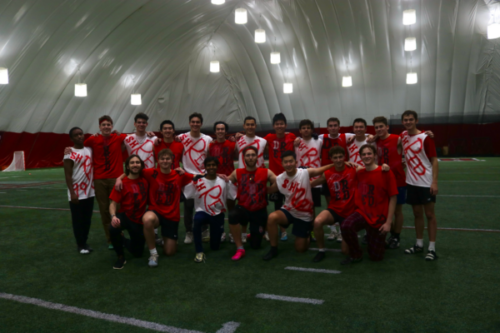Few sports have a reputation for being as inclusive and fun as ultimate frisbee. From elementary school gym classes to competitive leagues, the sport is loved and played worldwide. Harvard’s robust men’s ultimate frisbee program serves as a low-stress, supportive space for students to build community, stay active, and have fun. Whether players are seeking high-level competition or a more laid-back experience, the program offers a space for everyone.
The bifurcated structure of men’s ultimate frisbee is one of its most significant strengths. The program consists of two teams—Red Line, the more competitive A team, and Bred Line, the more relaxed B team. Red Line holds tryouts every fall, whereas Bred Line does not require tryouts to join and does not cut players. Red Line practices two to three times per week and competes in out-of-state tournaments during the spring, their official competition season. Tournaments are weekend-long events, so players typically take flights and stay in hotels together.
Current Red Line member Harry Warfel ’26 played on Bred Line for his first two years of college before making the jump to Red Line in his third year. He expressed to the Independent how the structure encourages everyone to get involved. “It’s nice to be given the opportunity where if you don’t have any experience, you just kind of want to hang out, meet some new people, [and] play a fun sport with other people who are also like-minded, Bred Line’s there for you,” Warfel said.
The culture of ultimate frisbee and the structure of the teams encourage everyone to get involved. “And then, if you want to have a bit more stakes attached to it, [and] have players on the team that expect more from you, there’s Red Line,” Warfel explained.
Warfel chose Harvard in part for its ultimate frisbee team. “When I was looking at colleges, I was trying to find a school with a [frisbee] team with a good community around it,” Warfel said. He started playing ultimate frisbee in high school as a laid-back alternative to soccer, which he played for 14 years.
Warfel served as the social chair of Bred Line for two years and continues to help organize community-building and social events as a Red Line player. He praised the strong community of men’s ultimate frisbee and shared multiple ways the team bonds. From Bred Line’s “sniping challenge,” where players sneakily capture photos of each other when they spot other team members around campus to playing video games and hanging out in each other’s rooms, the friendships made at practice extend into daily life.
Ultimate frisbee provides not only respite from the stress of school but also a continual source of accountability. “It’s an escape. It is a great way to stay active… say you’re not going to the gym as much as you would like—having a group of guys that expect you to be there kind of forces you to be a better version of yourself, which I really, really am thankful for,” Warfel said.
“[Frisbee] does serve as a break from my other school commitments. I think that’s a big reason why I play frisbee—there’s a therapeutic element to it… It definitely forces you to be present in the moment and what you’re doing,” Max Surprenant ’26, one of Red Line’s three team captains alongside Collin Lief ’26 and Julian Li ’25, said. “It’s nice to have a physical break from a lot of the stressful mental activities,” he elaborated.
“I made some very close friends with people who were in grades above me, and it was a good connection to upperclassmen, who served as a great example for…how to navigate and balance your time and find time for activities that make you happy, like frisbee,” Surprenant said, reflecting on the strong team community during his first year.
For Surprenant, the defining appeal of being part of a club sport, especially a club sport like Red Line, is that it serves as an organic and welcoming space to contribute to and exist in. “I think the biggest appeal for a club sport, and especially a club sport like Red Line, is that you learn to appreciate the pockets of culture that depend on students and that are created very organically.”
“There’s not a lot of personal incentive to commit to a team like Red Line. It doesn’t necessarily contribute to a career, it’s not a major resume point, and so you have to evaluate why you want to give a large chunk of your time each week to a team like that,” Surprenant said.
The men’s ultimate frisbee team works closely with Quasar, Harvard’s women’s ultimate frisbee team. The two teams have a strong relationship, joining for mixers, practices, and travel. Overall, the sport goes beyond being merely an extracurricular activity—it is a spirited avenue for community building. It creates a unique space in which commitment isn’t driven by personal accolades or career benefits, but by the shared experience of contributing to a supportive, self-shaped culture.
“I think I realized early on that it was a culture in which the more I gave, the more I got out of it,” Surprenant explained. “You have a lot of freedom to influence the culture and build the environment and atmosphere that you want to be in, and once you’ve created that, there’s a real feeling of support behind you and a place that you look forward to being on campus with people that you really care for.”
Kayla Reifel ’26 (kaylareifel@college.harvard.edu) was once on a competitive ultimate frisbee team for a single week.

